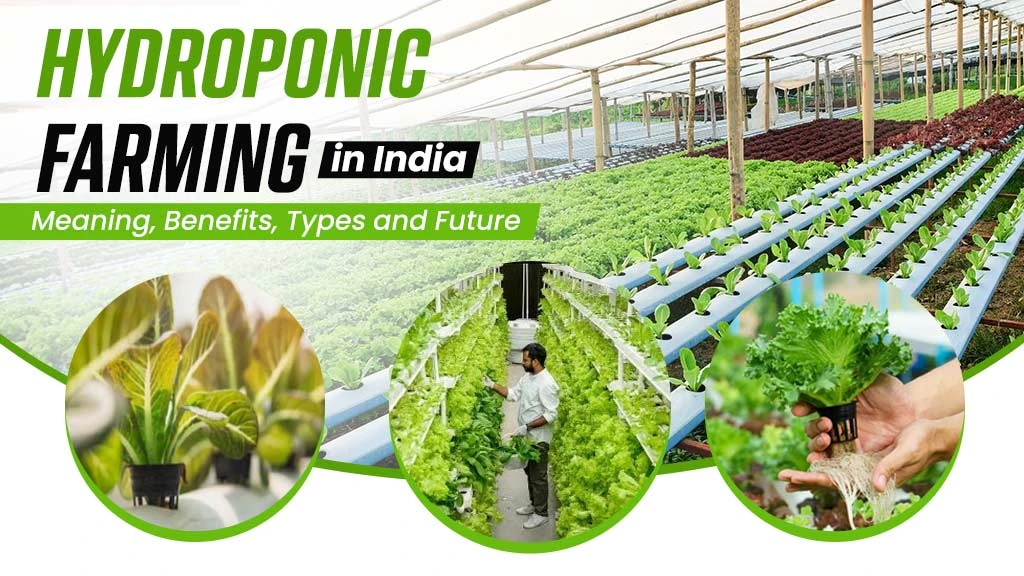
-
Phone:
+91 934 567 891 -
For Investments:
investment@farmmyland.in -
For Partnerships:
partnerships@farmmyland.in

As the global population continues to rise, food production must keep pace with increasing demand. However, traditional farming methods are struggling due to declining soil quality, unpredictable weather patterns, and a growing scarcity of agricultural land. In India, where agriculture is the backbone of the economy, finding sustainable and efficient solutions is crucial.
One such revolutionary technique is hydroponic farming—a soil-less method that allows crops to grow in a nutrient-rich water solution. This technology has gained traction worldwide, offering higher yields, reduced water usage, and the ability to grow crops in urban environments.
At Farm My Land, we believe hydroponics can transform Indian agriculture, making food production more efficient, profitable, and sustainable. In this article, we’ll explore how hydroponic farming works, its benefits, and why it holds the key to the future of farming in India.
Unlike traditional soil-based farming, hydroponics involves growing plants directly in a water-based solution infused with essential nutrients. The method eliminates the reliance on soil, ensuring optimal growth conditions for plants.
There are various types of hydroponic systems, including:
Each system offers unique advantages depending on the crop type, environmental conditions, and farming scale.
Traditional farming is highly dependent on soil quality, weather, and labor. Hydroponic systems, on the other hand, provide 30-50% higher yields than conventional farming due to precise control over nutrients, light, and water.
Water scarcity is a growing concern in India, with agriculture consuming nearly 80% of the country’s freshwater supply. Hydroponic farming drastically reduces water usage by recycling and reusing nutrient solutions, making it an eco-friendly alternative to traditional irrigation.
With urbanization and industrialization depleting fertile land, soil-based farming is becoming increasingly challenging. Hydroponics allows crops to grow without soil, eliminating the need for arable land and enabling farming in urban spaces, rooftops, and warehouses.
Hydroponic crops grow 30-50% faster than soil-based crops due to the direct availability of nutrients. Moreover, since these systems are typically housed in controlled environments, crops can be grown year-round, regardless of external weather conditions.
Soil farming often requires heavy pesticide use due to weeds, pests, and soil-borne diseases. Hydroponics eliminates the risk of soil contamination, reducing the need for harmful chemicals and ensuring clean, organic produce.
Hydroponic farms are particularly beneficial for high-value crops such as:
These crops are in high demand in premium urban markets, supermarkets, and export businesses, offering lucrative profit opportunities for farmers.
Despite its benefits, hydroponic farming faces some challenges:
At Farm My Land, we aim to democratize hydroponic farming by making it accessible, profitable, and scalable. Our approach includes:
By integrating hydroponics into mainstream agriculture, we can revolutionize food production, ensure food security, and create profitable opportunities for Indian farmers.
With increasing population pressure, shrinking arable land, and climate uncertainties, India needs innovative farming solutions. Hydroponics offers a sustainable, high-yield alternative to traditional agriculture, making it an essential component of India’s food security strategy.
The next decade will witness a massive shift towards hydroponic farming, and Farm My Land is committed to leading this transformation.
Hydroponic farming is more than just a trend—it is the future of agriculture. With higher yields, lower water consumption, and reduced dependency on soil, this innovative farming method offers a scalable solution to India’s agricultural challenges.
At Farm My Land, we are building a nationwide hydroponic farming ecosystem that empowers farmers, investors, and urban entrepreneurs. By adopting sustainable, tech-driven solutions, we can reshape Indian agriculture and create a future where healthy, high-quality food is accessible to all.
Join us in revolutionizing Indian agriculture.